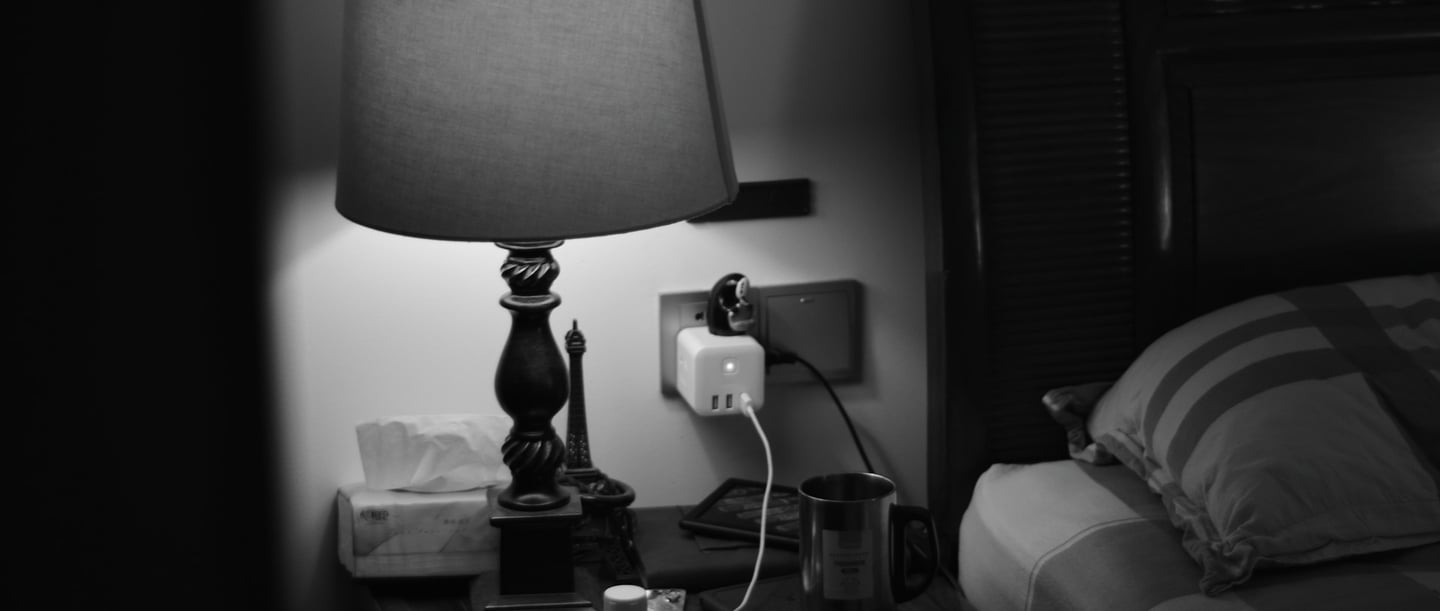Sleeping next to a plug socket – do power sources have an impact on sleep quality?
Many people’s beds are right next to a plug socket – whether it’s to charge their mobile phone overnight or power a lamp or radio alarm clock. This raises the inevitable question … is sleeping next to a plug socket healthy? Could electrosmog be affecting your sleep or even harming your health? We explain the effects power sources and electromagnetic fields can have on your bedroom – and how you can protect yourself.
April 2, 2025 • 2 min reading time

Is it harmful to sleep next to a power socket?
Plug sockets themselves only generate minimal electromagnetic fields – devices that are plugged into them, though, generate significant amounts of radiation.
Electrosmog in the bedroom is also caused by mobile phones, alarm clocks, chargers or Wi-Fi connections.
Anyone who is particularly sensitive to electric fields should remove such sources of interference from their sleeping area in order to improve sleep quality.
The term electrosmog is often associated with high-voltage cables, mobile phone radiation or Wi-Fi. However, weak electromagnetic fields are also generated within our homes – more precisely in our plug sockets and electrical appliances.
These fields always arise when electricity flows through a cable. The higher the voltage and the more devices in the vicinity, the more intense the electromagnetic load – this is simple logic. Is this really a problem for our sleep, though?
So far, there’s no clear scientific evidence that electrosmog in normal household doses permanently disrupts sleep quality. Nevertheless, some people do report sleeping problems, headaches or restlessness – especially if a number of electrical devices are active in the area where they sleep.
Although plug sockets themselves only emit small electric fields, there are certain devices that can increase radiation exposure in the bedroom. Children in particular are often sensitive to these typical sources of interference:
Mobile phones by the bed – these create a magnetic field, especially while they’re charging. Wi-Fi or Bluetooth connections can also lead to increased radiation.
Alarm radio and digital alarm clocks – some components, particularly within older models that you have to plug into a socket, often generate electric fields.
Bedside lamps with mains power supply – smart lamps, dimmable night lights or LED lights can be unexpected sources of interference if they’re not well shielded.
Multiplug adapters and extension leads – several connected devices in direct proximity to your head amplify harmful electromagnetic fields.
If you’ve placed one or more of these sources near your bed and have trouble sleeping at night, it may be worth turning these devices off or unplugging them for a while. This way, you can see whether your sleep improves – it won’t harm your health to try!
If you have concerns or simply want to make your sleeping area more ‘electric-friendly’, there are a few simple measures you can try:
Increase the distance between your bed and the plug socket to at least one metre
Switch off electrical devices or remove them from the room at night
Switch to battery-powered alternatives such as analogue alarm clocks
Avoid placing socket strips under the bed
Put your phone on flight mode at night – this will switch off your Wi-Fi and Bluetooth connections
Some people also report better sleep if they use grounded bedding or have natural materials and plants in their sleeping area. Although there’s no clear evidence that these measures work, the proof of the pudding is in the eating!
Whether the plug socket itself really has a negative effect on sleep quality hasn’t been clearly established scientifically yet. Nevertheless, many people report being restless or having trouble sleeping when they have multiple electrical devices active in the bedroom.
If you think you’re sensitive to sources of interference, such as your mobile phone, alarm clock or LED lights, you can make a few simple changes to reduce electrosmog in the bedroom. Switch off your devices at night, increase the distance between your bed and the plug socket and reduce radiation emitted via Wi-Fi or Bluetooth. Try it yourself! Do you sleep better with less technology in the bedroom?
Discover more topics from our blog that might interest you:




